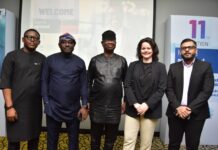The National Directorate of Employment (NDE) in Abia State, has said it is collaborating with DBX Integrated Business Limited to upgrade the skills of citizens of the State in trades such as hospitality, fashion industry and digital technology.
Mrs. Tessy Wachuku, State Coordinator of NDE in Abia State, said that the goal of the training is to equip participants who are already practicing their various trades with the current methods in line with prevailing economic realities.
“National Directorate of Employment, (NDE), Abia State wishes to collaborate with the DBX to train 30 Artisans by offering our expertise in equipping them with specified modern techniques in line with their trades and marketing skills as well as provide necessary guide to them. We pride ourselves in providing jobs to all categories of people irrespective of class or status” she said.
Wachuku noted that NDE Abia has experienced trainers in over eighty skills in Agriculture, Special Public Works, Constructions, Entrepreneurship, Vocational trades, and so on, who are accredited to handle training of trades men and women across the State.
Speaking on the collaboration, Mr. Uchenna Kalu, Managing Director/Chief Executive Officer of DBX Integrated Business Limited said the alliance with NDE on the training is borne out of the need to arrest an ugly trend in which tradespeople abandon their training and go back to poverty. He noted that this was as a result of the artisans being outdated and lacking in basic business skills to generate adequate income to sustain themselves and grow their businesses.
“Findings have shown that upward mobility, growth and profitability for skilled tradespeople remain low, with many of them easily slipping back to poverty and even abandoning the skills they have trained for years to acquire” he said.
He reiterated the need for constant upgrade of vocational skills especially as the local and world’s economy keep changing.
“While learning a trade is one good way to beat unemployment and poverty, not upgrading those skills as market dynamics change can keep a skilled person behind.
“Again, many tradespeople know the technical side of the business but have no clue about the business and financial end of it. This gap, we have discovered, keeps the business stunted and the owner frustrated,” he noted.
To address the challenge and enable tradespeople overcome stagnation and grow their businesses, the organizers said they will be offering an upgraded training programme to a set of practicing tradespeople in Hospitality (Chefs, Bakers/Pastry Chefs, Event Managers/Planners, Interior Decorators, etc.), Fashion Industry (Tailors, Leather Goods and Accessories, Jewelry Designers/makers etc.) and Information and Communication Technology (ICT – Graphic Designers, Web Developers, Software Engineers, Computer Technicians, etc.).
The training tagged ‘Trade Upgrade Educational Project’, is aimed at bridging the identified gap by bringing the participants up to speed on the latest developments in their respective fields as well as equipping them with the requisite business and financial skills that will enable them grow their businesses and participate in the wider economy.
According the State Coordinator of NDE in Abia, the selected participants will be instructed by resource persons who are well experienced in the new trends in their respective trades for the period of the training.
She also noted that the training would be concluded with evaluation of the participants’ progress.
For over three decades, the NDE, through the machinery of skills acquisition in Vocational, Agricultural, Entrepreneurial and activities in the Public Works Sector as well as collaborations with both local and international organizations, and private individuals, has impacted over 10 million unemployed Nigerians. This year alone, Wachuku stated, NDE plans to train over ninety-three thousand Nigerians in different high-income generating skills across the nation.
In Abia State, the Directorate has successfully collaborated and is still collaborating with many local, International Organizations and private individuals in creating jobs for the vulnerable and indigent persons through Skills Acquisition as well as trades upskilling across the 17 Local Government Areas of the State.














